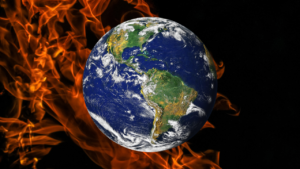Physical Address
23,24,25 & 26, 2nd Floor, Software Technology Park India, Opp: Garware Stadium,MIDC, Chikalthana, Aurangabad, Maharashtra – 431001 India
Physical Address
23,24,25 & 26, 2nd Floor, Software Technology Park India, Opp: Garware Stadium,MIDC, Chikalthana, Aurangabad, Maharashtra – 431001 India

By Vivek Saini
United Nations Secretary-General Antonio Guterres warned the world sternly, declaring that the era of global warming is over and that we have now entered an “era of global boiling.” The pollution that traps sunlight and creates a greenhouse effect surrounding the Earth has caused the global average temperature to climb steadily, exacerbating weather extremes. According to the World Meteorological Organisation (WMO) and the European Union’s Copernicus Earth observation programme, global temperatures shattered records last month, fueled by the use of fossil fuels and causing catastrophic weather.
What is Global boiling? Should we be worried about it
Along with the terrible heat, there were tremendous rains and flooding, particularly in India and China. Not just the carbon cycle but also the water cycle has been accelerated by fossil-fueled modernity. We should never have called it Earth; we live on an oceanic planet, and the majority of the extra heat is being absorbed by oceans that are now hotter than ever. Because of their warming currents, a Mexico-sized section of Antarctica failed to refreeze this year.
Increased levels of water vapor, a potent greenhouse gas caused by global warming, turbocharges the massive atmospheric heat engine, resulting in more intense weather. It is not for nothing that UN Secretary-General Antonio Guterres has announced a new period of “global boiling.” Look at the graph below carefully: July deviates by more than four standard deviations from the 1979-2000 mean.
Image 1. The first three weeks of July shattered temperature records. EU’s Copernicus satellite data shows the globally averaged surface air temperature for 1–23 July each year from 1940 to 2023.
Other records have been broken amid the weather disasters, including the most air transport passengers in a single day in the United States, the highest-ever revenues for European airlines IAG and Air France-KLM, record oil consumption, and record coal production. Right-wing political opposition to climate action is also growing between climate extremes.
Record-breaking temperature in July
The hottest July, perhaps the warmest in the past 120,000 years, occurred this year. Four “Heat Domes” in the northern hemisphere—over West Asia, North America, North Africa, and Southern Europe—contributed to record-breaking temperatures that exceeded them by several degrees. These “Heat Domes” caused temperatures to skyrocket. Winter has transformed into a scorching summer in the Andes. Massive wildfires burning in Canada have completely obscured the sun.
Image 2.
Around the world, this July saw heat waves that broke records, particularly in the Southwest of the United States, Mexico, China, and the Mediterranean region. The records are mostly related to the general increase in global temperatures brought on by the surplus heat that humans burning fossil fuels have trapped in the atmosphere. The World Weather Attribution group’s report concluded that the North American and European heat waves would have been “virtually impossible” without climate change. It also discovered that the likelihood of a heat wave like the one in China was 50 times higher in our current, warmer world. The three heat waves were hotter than they otherwise would have been due to global warming.
Three water treatment facilities in India were submerged as the Yamuna River overflowed its banks, prompting the Delhi state administration to issue a drinking water scarcity alert. Due to drought, more than half of Uruguay’s population no longer has access to safe drinking water. As it is anticipated that the scenario could linger for months, the government is giving out bottled water to the population. Everything is planned with a tolerance level, including foundations, transmission cables, sewers, highways, bridges, and subway stations. Natural disasters disrupt our technological world because they are carbon-charged.
Rethinking the calamity
According to Guterres, the “only surprise is the speed of the change,” which has exceeded scientists’ “predictions and repeated warnings” regarding the devastating effects of climate change. He reiterated his plea for quick and extensive action in the face of “tragic” repercussions, once more focusing on the fossil fuel industry.
In the face of “tragic” consequences, he repeated his call for swift and far-reaching action, again aiming at the fossil fuel sector.
“The air is unbreathable. The heat is unbearable. And the level of fossil fuel profits and climate inaction is unacceptable,” said Guterres, former Portuguese prime minister. “Leaders must lead,” he said. “No more hesitancy. No more excuses. No more waiting for others to move first.”
According to climate change author David Wallace-Wells, the future will be “contested and combative, combining suffering and flourishing -though not in equal measure for every group.”
As Rob Nixon and Frederick Buell noted, a hotter Earth will exacerbate current and new human vulnerabilities. Both authors note that those suffering from poverty and marginalization already experience yearly crises. They share what Nixon calls “slow violence,” which is accentuated by significant environmental occurrences like landslides and poor crops.
When Guterres uses expressive language, he’s not asking us to picture the apocalypse as it appears in films. He wants people to pay attention and take action now that we can all clearly see the effects of climate change.
References: